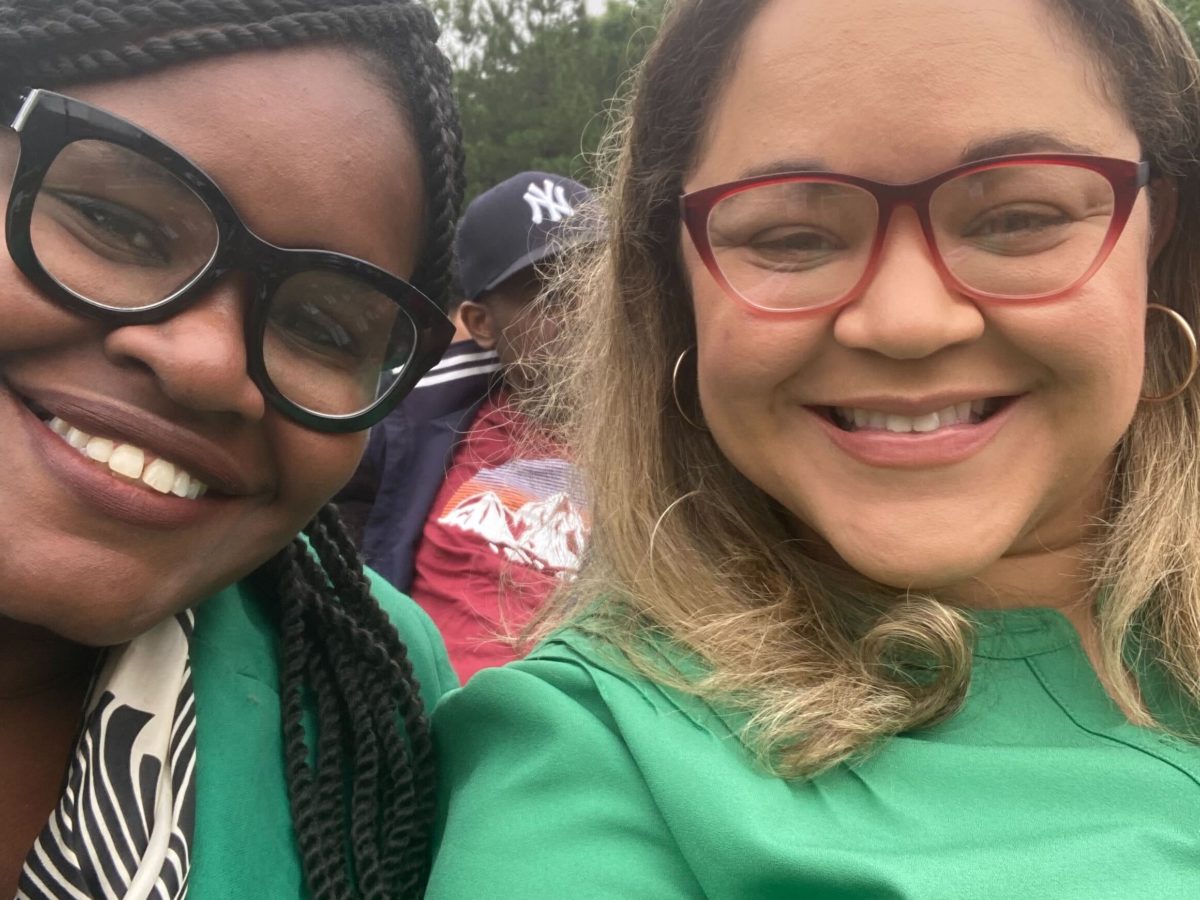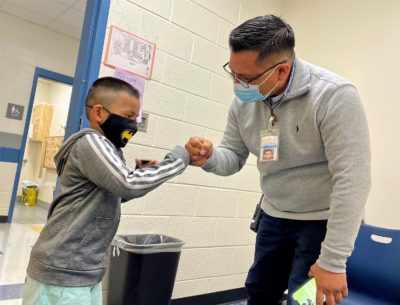

The following is part of my monthly column, One Day and One Goal: Expanding opportunity in N.C. I invite you to follow along as I share stories from classrooms and explore critical issues facing education in our state. Go here for past columns.
In his first semester teaching in 2021, Teach For America corps member TJ Elliott had a familiar name on his student roster. The son of fellow first-year corps member Keely Major was in his class and provided his first introduction to forging parent-teacher relationships.
“Having a parent in the building made things simple,” TJ says. “Life happens, kids miss school, but [when parents are involved] you know that they won’t be lost on the other side.”
Committed educators and parents like Keely offer connections between the home and school life of students that serve their family and their school community in myriad ways. Their perspectives have only become more valuable since COVID-19’s disruption of “normal” school practices since they have seen both the personal and professional challenges of keeping rigor and engagement high for all students in public education. They’ve also demonstrated how important a connected community of students’ educators and families can be when working toward a future where all students can thrive.
As a parent myself, working in education has afforded me a 360-degree perspective I wouldn’t ordinarily have. After sitting in seats at both the higher education and K-12 tables, I understand the trajectory from childhood to adult learning and the implications of having a support system that believes in student potential. It’s what guided our family’s decisions as my son navigated his public education and college degree.
That’s why I want to highlight two fellow education leaders whose roles as parents have added an additional level of experience, urgency, and impact to their work serving K-12 students.
Developing a diverse school community
Samantha Dale is a staff member with Teach For America, working with teachers in Granville, Vance, and Warren counties as well as with two charter networks in eastern North Carolina. Her experience as a veteran educator as well as her role as a mother of two sons who, like her, are members of the Haliwa-Saponi Tribe, led her to equity-driven work.
“Equity is not a guarantee. That is something I know,” Samantha says. “I bring it to the table every time I have a conversation.”
In addition to her work as a teacher coach, she’s applied this practice to relationships she holds at her sons’ charter school.
“Equity has to be at the forefront of our decisions,” she continues. “Is this decision isolated to my child? My sons? If not, what does it look like to be extended to their whole classroom?”
With this in mind, Samantha applied to and was selected to serve on her sons’ charter school board. In doing so, she was the first woman and first Native person to sit on the board. She would go on to become board chair not long after.
When I spoke with Samantha a few weeks ago, it was her last day serving on the school board, yet the legacy of her work is sure to live on. She not only facilitated diversity-based professional development training for the school board while acting as chair, but also oversaw its new application system to help ensure the further diversification of board members as well as their student constituents. Though she recognizes there is much more work to be done to benefit the entire school community, in reflecting over her two years as school board chair, there is much to celebrate.
“As a former teacher, I know the language, and I know what I need to say. I know how the system works. I found my avenue to disrupting those systems. Not all of the decisions we’ve made have benefitted my sons specifically, but being here benefits my children. They see me sitting at this table and know that someone is advocating for them, and not just them.”
Parent educators have experience and expertise
By day, Amy Hawn Nelson is a celebrated education researcher and writer based in Charlotte. In her spare time, however, she is the Parent-Teacher Association President and occasional substitute teacher at Charlotte East Language Academy (CELA).
She is a vocal advocate for CELA for a number of reasons, including her intimate understanding of school segregation from years of research and publication, not to mention first-hand experience as an alumna of Teach For America.
“My daughter is a blonde-haired white child. Many like her will pass their whole lives without being in community with a person who isn’t white,” Amy says. “We wanted her to be bilingual, to love learning, and to learn in a multicultural environment, and CELA has given her that. She’s had amazing teachers that help her and her peers feel cared for and nurtured.”
Amy also loves that CELA is a magnet school with a K-8 model. With housing affordability resulting in higher instability for many families’ housing situations, students can rely on a stable peer group from kindergarten until high school at CELA.
“That’s a benefit of magnet schools not all families recognize,” Amy says. “That’s why I’ve put my blood, sweat, and tears into CELA.”
Her commitment to CELA’s PTA dovetailed with COVID-19’s rise, and she found herself surrounded — at a safe distance, of course — by only three or so other engaged members.
“The role of the PTA is to ‘support’ the school, but what does that even mean?” Amy says, reflecting on the sentiments many full-time employed parents shared when trying to engage with their school community. “It’s really freaking hard!”
She began by asking, “What can I do to help?” The answer was two-fold.
First, she worked to recruit more members to the PTA, including members and officers who would better represent the full diversity of the school community. Second, she sought out to support teachers by regularly volunteering and serving as a substitute teacher. Soon, she was joined by other members who also volunteered their time, filling a critical gap to support teachers.
Now, the PTA boasts over 20 engaged members and is steadily growing. Seeing the connectedness fostered within the CELA school community has been a byproduct of intentional effort and outreach.
“There’s a wonderful neighborhood school my children could attend based on our address, but CELA is actually closer.” Perhaps in more ways than one.
Equity for all parent educators
Amy and Samantha are powerful examples of education advocates, yet both would say they have a unique privilege in the positions and influence they hold. How many parents, including K-12 educators, are unable to achieve similar results because they lack capacity?
According to a recent report from the Department of Public Instruction, 7% of North Carolina’s teacher attrition during the 2020-2021 school year was due to “family responsibilities” and/or child care, a 2% increase from the previous year. These are teachers with relatively fewer years of education and experience and likely receive the lowest levels of compensation. And though this data isn’t broken down demographically, we can infer that the majority, if not all, of these teachers identify as female given that the ratio of North Carolina’s teaching force is nearly four to one.
So, if we were to read these numbers a different way, we could say that “family responsibilities” are one hindrance to teachers advancing in their tenure and earning more to provide for their families: an unfortunate catch-22 for anyone in our field looking to “have it all.”
We cannot continue to lose talent from our school buildings over inequitable benefits like family leave, let alone compensation that adequately covers child care. Considering that women make up over 74% of K-12 classroom leaders nationally, this will continue to affect schools until we begin to treat some of the root causes — rather than merely symptoms — of our growing teacher shortage.
Parent educators, regardless of gender, deserve to be honored for the work they do, as well as the unique perspective they bring to the classroom. When they are, the results speak for themselves.




